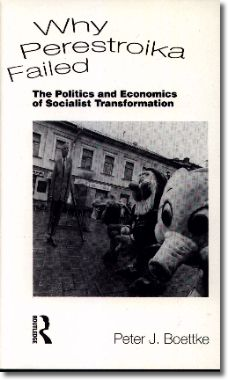Why Perestroika Failed: The Politics and Economics of Socialist Transformation. New York: Routledge, 1993.

Why Perestroika Failed is the first book to apply an Austrian market process approach to analyze the economic dimensions of the Soviet system, and a public choice approach to address the political aspects. Boettke presents a critical assessment of the reform movement, examining the various proposals and paradoxes of the Soviet efforts.
Boettke argues that perestroika failed partly because it was never implemented. He goes on to demonstrate that even if the perestroika program had been carried out fully, it would not have produced the structural changes necessary to revive the Soviet economy. A knowledge of why perestroika failed is a crucial importance as the former Soviet republics and East and Central Europe chart a new course.
View by chapter:
1. Introduction
2. The Road to Nowhere
3. The Theoretical Problems of Socialism
4. The Nature of the Soviet-type System
5. The Logic of Politics and the Logic of Reform
6. Credibility of Soviet Reforms
7. Charting a New Course
8. Conclusion
Comments:
"Peter Boettke's book is one of the few in which an economist deploys his own disciplines in that fuller context [to address the structural problems of the Soviet system]."
Robert Conquest
Senior Fellow at the Hoover Institution on War, Revolution and Peace, Stanford University, from a review essay in The Times Literary Supplement (July 9, 1993): 3-5.
"This is a well-written and occasionally polemical analysis of what was wrong with Marx's vision of socialism and with its "Soviet" version, and of the attempts to reform the system, plus some guidelines as to how to achieve a rapid transition to capitalism... Many times Boettke hits his target with precise effect. Thus he correctly stresses the utopian elements in Marx's vision of socialism, the irrationalities and distortions typical of the traditional Soviet system, as well as the contradictions which accompanied the attempts to reform it under Gorbachev."Alec Nove
Professor of Political Economy, University of Glasgow, from a review that appeared in Review of Political Economy, 6, no. 4 (1994).
"Peter Boettke's Why Perestroika Failed is an ambitious book that succeeds in its effort to demonstrate the inevitability of the failure of Soviet economic reform in the Gorbachev era. This is not what is most interesting about the book, however, as other authors have already been over this ground. Instead, Why Perestroika Failed represents an important contribution to the literature on the (post) Soviet-type economies in two respects. First, Boettke analyzes the Soviet system, perestroika, its collapse and the post-communist transition from an unabashedly public-choice theory to a Soviet-type economy and a subsequent transition to capitalism, it does represent the most recent and comprehensive undertaking in this regard. Second, Boettke's book also constitutes a provocative integration of public choice theory, sovietology, history of economic thought and Russian economic historiography, with attendant implications for the post-communist economic transition. this is the most important contribution of Why Perestroika Failed... those who are interested in updating the von Mises/Hayek critique of socialism, mixing it with the Buchanan/Tullock logic of public choice, and extending the synthesis to the collapse of the Soviet system and the subsequent post-communist transitions, are likely to find Why Perestroika Failed fascinating. "Ben Slay
Professor of Economics, Bates College. From review in Slavic Review, 53, no. 3 (Fall 1994): 875-876.
"Within the recent wave of reflections on perestroika Boettke's book is among those with the highest theoretical ambitions.... The book is inspired by the Hume-Hayek tradition , which is extremely well applied in the explanations of the structural weaknesses perestroika failed to overcome. Perestroika did not bring changes in institutional rules which would allow experiments in social organization that are seen as a basic requirements of any sustainable economic system.... Whether you agree or disagree with the arguments the book gives an excellent and consistent view on the topic."Slavo Radosevic
Professor, University of Sussex. From review in Europe-Asia Studies, 45, no. 5 (1993): 933-934.